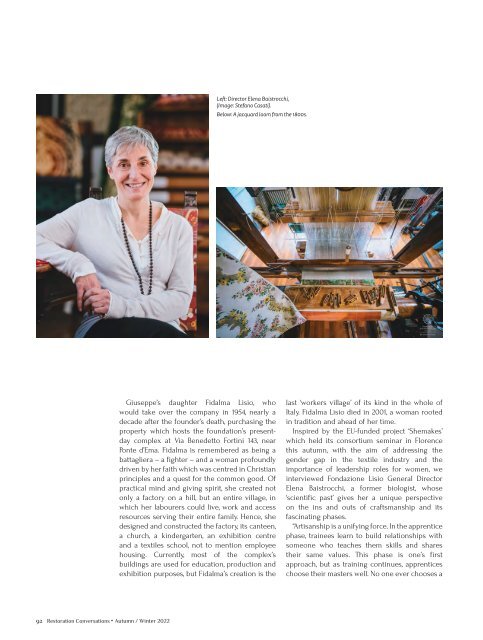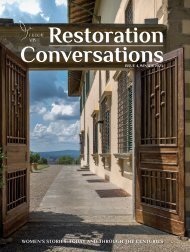Autumn/Winter 2022
Restoration Conversations is a digital magazine spotlighting the achievements of women in history and today. We produce two issues a year: Spring/Summer and Fall/Winter
Restoration Conversations is a digital magazine spotlighting the achievements of women in history and today. We produce two issues a year: Spring/Summer and Fall/Winter
You also want an ePaper? Increase the reach of your titles
YUMPU automatically turns print PDFs into web optimized ePapers that Google loves.
Left: Director Elena Baistrocchi,<br />
(Image: Stefano Casati).<br />
Below: A jacquard loom from the 1800s.<br />
Giuseppe’s daughter Fidalma Lisio, who<br />
would take over the company in 1954, nearly a<br />
decade after the founder’s death, purchasing the<br />
property which hosts the foundation’s presentday<br />
complex at Via Benedetto Fortini 143, near<br />
Ponte d’Ema. Fidalma is remembered as being a<br />
battagliera – a fighter – and a woman profoundly<br />
driven by her faith which was centred in Christian<br />
principles and a quest for the common good. Of<br />
practical mind and giving spirit, she created not<br />
only a factory on a hill, but an entire village, in<br />
which her labourers could live, work and access<br />
resources serving their entire family. Hence, she<br />
designed and constructed the factory, its canteen,<br />
a church, a kindergarten, an exhibition centre<br />
and a textiles school, not to mention employee<br />
housing. Currently, most of the complex’s<br />
buildings are used for education, production and<br />
exhibition purposes, but Fidalma’s creation is the<br />
last ‘workers village’ of its kind in the whole of<br />
Italy. Fidalma Lisio died in 2001, a woman rooted<br />
in tradition and ahead of her time.<br />
Inspired by the EU-funded project ‘Shemakes’<br />
which held its consortium seminar in Florence<br />
this autumn, with the aim of addressing the<br />
gender gap in the textile industry and the<br />
importance of leadership roles for women, we<br />
interviewed Fondazione Lisio General Director<br />
Elena Baistrocchi, a former biologist, whose<br />
‘scientific past’ gives her a unique perspective<br />
on the ins and outs of craftsmanship and its<br />
fascinating phases.<br />
“Artisanship is a unifying force. In the apprentice<br />
phase, trainees learn to build relationships with<br />
someone who teaches them skills and shares<br />
their same values. This phase is one’s first<br />
approach, but as training continues, apprentices<br />
choose their masters well. No one ever chooses a<br />
92 Restoration Conversations • <strong>Autumn</strong> / <strong>Winter</strong> <strong>2022</strong>





